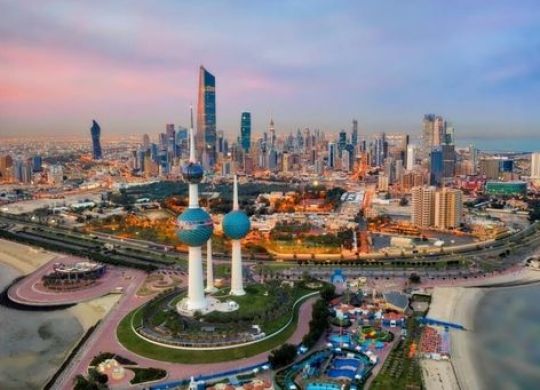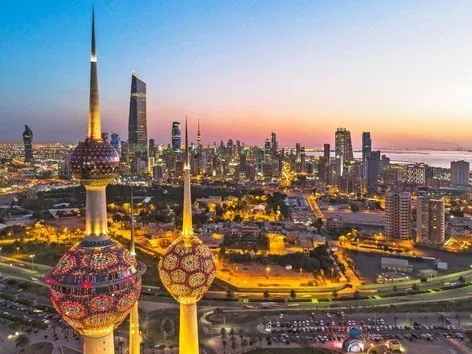Moving to Kuwait in 2024: necessary documents, important rules, pros and cons of permanent residence in the country

More and more expats are considering Kuwait as a place of permanent residence. And this is not surprising, as the country offers a high standard of living, decent salaries, quality education and medical services. However, it is not easy for foreigners to obtain a residence permit. Learn more about the peculiarities of moving to Kuwait for permanent residence in 2024
Kuwait is a small but very rich Muslim country. A huge amount of oil reserves are concentrated here, which is why the country's economy is considered one of the most profitable in the world. The standard of living is high, but the population is small and the society is closed. It is almost impossible for a foreigner to obtain Kuwaiti citizenship. The official language is Arabic, but English is used as a business language.
The cost of living in Kuwait is generally high, especially for housing and private school. However, other costs such as local food, transportation and utilities are acceptable.
Advantages and disadvantages of living in Kuwait
Kuwait, a small country in the Persian Gulf, is a popular destination for expats due to its economic stability and high standard of living. However, there are both advantages and disadvantages to living in Kuwait that you should consider when deciding to relocate.
Advantages of living in Kuwait for expats:
1. Economic opportunities. Kuwait is one of the richest countries in the world due to its significant oil reserves. This creates numerous economic opportunities for expats, especially in the oil industry, construction, finance and education. High salaries and attractive benefits packages are significant advantages for those seeking career development;
2. High standard of living. Kuwait offers a high standard of living with excellent infrastructure, modern medical services and quality education. Many expats can enjoy comfortable living conditions due to high salaries and no income taxes, which allows them to save more and spend more on entertainment;
3. Security. Kuwait is considered one of the safest countries in the region. Low crime rate and high level of security make it an attractive place to live, especially for families with children;
4. Quality education. Kuwait offers excellent educational opportunities, including international schools that provide high quality education in accordance with Western standards.
Disadvantages of living in Kuwait for expats:
1. Harsh climate. One of the main disadvantages of living in Kuwait is its harsh climate. Summers in Kuwait can be extremely hot, with temperatures exceeding 50 degrees Celsius;
2. High cost of living. Although salaries in Kuwait are high, the cost of living can also be significant. Housing, international schools, and some imported goods can be expensive;
3. Restrictions on freedom. Kuwait is a conservative Muslim country with strict laws and regulations. For example, alcohol consumption is prohibited and there are strict restrictions on behavior and dress in public places;
4. Language barrier. Although English is widely used in business and education, Arabic is the official language of Kuwait;
5. Limited entertainment. Although Kuwait has many shopping centers and restaurants, entertainment options may be limited compared to more liberal countries. The lack of bars, clubs, and other forms of entertainment may be a disadvantage for some expats.
Living in Kuwait for expats has its advantages and disadvantages. The high standard of living, security and economic opportunities make Kuwait an attractive place to work and live. However, the harsh climate, high costs, and cultural restrictions can be significant challenges. Given these factors, expats should carefully consider their decision to relocate to Kuwait, weighing the pros and cons to ensure a comfortable and satisfactory stay in this unique country.
For safe relocation to any country in the world, obtaining citizenship and employment, take the advice of an international lawyer. We help to solve complex and simple issues for your comfort and safety in any part of the world.
Conditions of stay in Kuwait and types of visas
To enter Kuwait, you need one of the following visas:
1. Employment visa;
2. Business visa;
3. Tourist visa;
4. Family reunification;
4. Student visa.
All types of visas require an invitation from a sponsor. Ideally, you should have it at the stage of planning your trip. It can be a family member, hotel or employer.
There are e-visas for entry to Kuwait and they have the same legal force as physical visas. The only difference is in the convenience of processing and submitting an application. The maximum length of stay in Kuwait on a visa is 90 days. Work, student and family reunification visas can be extended. Health insurance is mandatory. By the way, you can get it on our website.
A visa to Kuwait can be obtained by:
1. Online through the website of the Ministry of Interior of Kuwait (tourist visas);
2. At the airport of Kuwait City upon arrival (tourist visas).
3. You can also apply for a visa to Kuwait at the General Department of Residency of the Ministry of Internal Affairs of the State of Kuwait.
If you need to extend the validity of your visa, you must personally apply to the General Department of Residency of the Ministry of Internal Affairs of the State of Kuwait.
The following documents are required to apply for a visa to Kuwait:
1. Foreign passport;
2. A completed application form in English;
3. Invitation from the sponsor;
4. Work permit;
5. Documents confirming admission to the university;
Paid consular fee.
If your passport has stamps of entry to Israel, you will be denied a visa. And sometimes women who are going to travel to the country without a male escort have difficulties. Before planning a trip or emigration to Kuwait, legal advice is an ideal option to avoid difficulties and to be able to successfully solve them.
Acquisition of citizenship in Kuwait
Obtaining Kuwaiti citizenship is a complicated process that requires fulfillment of a number of conditions. Adults can obtain citizenship by decree issued on the recommendation of the Minister of Interior if they meet the following criteria:
1.The applicant must have been lawfully residing in Kuwait for a minimum of 20 consecutive years, or 15 years if he or she is an Arab. The permanent residence requirement does not apply if the applicant leaves the country on business. In cases where he/she leaves for other reasons but intends to return, the time spent abroad is not counted in the total period of residence;
2. The applicant must have legal means of earning a living, be of good character and not have been convicted of a crime;
3. Arabic language proficiency is required;
4. The applicant must be qualified to perform or provide services that are required in Kuwait;
5. He must be an indigenous Muslim or convert to Islam in accordance with the established rules, and at least five years must have passed since the conversion to Islam before naturalization.
The Minister of Interior appoints a Committee of Kuwaiti Citizens to select candidates for naturalization in accordance with these provisions.
The spouse of a foreigner who has been granted Kuwaiti citizenship does not automatically become a citizen. She must submit an application for her desire to become a citizen within one year from the date of her husband's naturalization. Minor children of a foreigner automatically become Kuwaiti citizens together with their father.
New rules for expats to leave Kuwait
The Kuwaiti Ministry of Interior emphasizes that expats with outstanding debts must pay them off before leaving the country. Since September, local authorities have begun to collect money owed by foreign nationals to the Ministry of Transportation. The First Vice Prime Minister and Minister of the Interior instructed government agencies to cooperate in collecting foreigners' debts.
The Ministry of Internal Affairs also initiated the enforcement of the decision to pay off the debt to the Ministry of Communications. Sheikh Talal Khaled Al Ahmad Al Sabah emphasized that all foreigners wishing to leave the country must pay their debts to the state. Payment can be made through the Ministry of Communications website or the Sahl app.
Unfortunately, the immigration policy in Kuwait is very strict and closed. This is due to the history of the country, as well as its small population and large economic resources. According to the principle of a rich but small country, the government gives maximum priority to the indigenous population in order to expand and develop its own nation. Therefore, residents have limited periods of stay and opportunities. Citizenship can be obtained by naturalization as “special citizenship” by marriage to a Kuwaiti spouse. This option is possible if the wife is a Muslim or converts to Islam before the wedding. The government grants citizenship only if the father is a Kuwaiti citizen and an indigenous resident.
Igor Usyk - Head of Legal Department at Visit World
To ensure a safe move to Kuwait, I advise you to contact a specialist. My colleagues, qualified specialists with legal education, will help you avoid unpleasant situations during migration abroad.
Products from Visit World for a comfortable trip:
Checklist for obtaining a visa and necessary documents in Kuwait;
Legal advice on immigration to Kuwait;
Travel insurance for foreigners in Kuwait;
Medical insurance all over the world.
Recommended articles
2 min
Work
Work in Kuwait in 2025: Benefits, Types of Work Visas and Enhanced Requirements for Foreigners
In 2025, Kuwait continues to attract professionals with its high salary levels, lack of taxes, excellent standard of living and a range of employment opportunities. Learn about the benefits of working in the country, the types of work visas available and the conditions for working for foreigners
08 kwi. 2025
More details2 min
Residence permit
Kuwait has announced the introduction of new rules for issuing residence visas for expats in the country. Find out more about why expats will not be able to leave Kuwait, when they may not be able to extend their residence permits, and what other changes to migration legislation have been approved by the Kuwaiti authorities
14 wrz. 2023
More details2 min
Popular
Dutch anti-poverty experiment: additional 150 euros for 600 families
A new project called "Just Give Money" has been launched in the Netherlands to support low-income families with additional funds. As part of the project, 600 families will receive €150 per month for 2 years. Learn more about the details of the “Just Give Money” project in the Netherlands
10 cze. 2024
More details2 min
Expats
Non-lucrative Spanish visa in 2025: criteria, requirements and common mistakes when designing
Expats from different parts of the world are attracted to the Spanish way of life. Any foreigner who has a sufficient level of financial support can move to the country. Find out what you need to apply for a non-profit visa to Spain and the most common mistakes applicants make
17 sty. 2025
More detailsAll materials and articles are owned by VisitWorld.Today and are protected by international intellectual property regulations. When using materials, approval from VisitWorld.Today is required.
